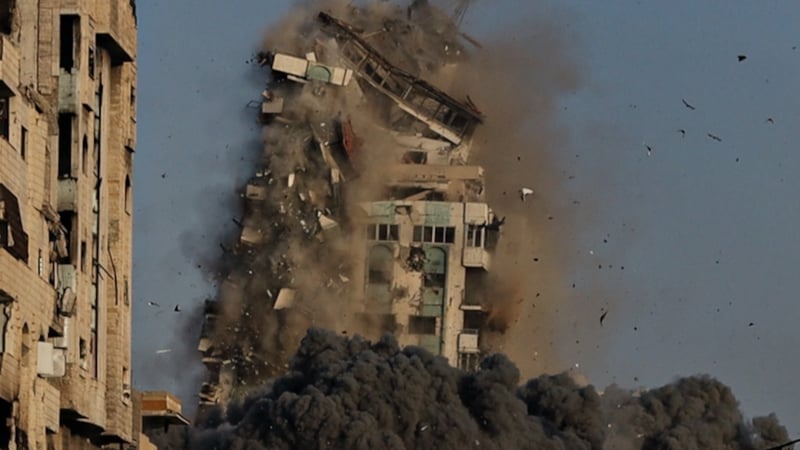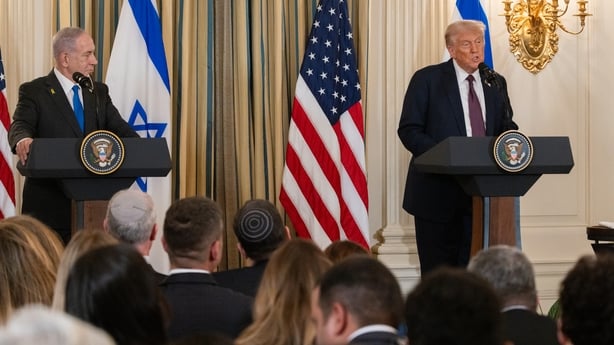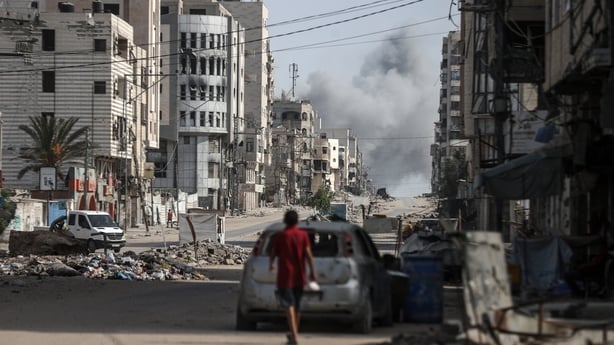Breaking News
Netanyahu says he did not agree to Palestinian state

Read more on post.
Israeli Prime Minister Benjamin Netanyahu has said that he did not agree to a Palestinian state during his talks with US President Donald Trump at the White House yesterday.
“Not at all, and it is not written in the agreement. One thing was made clear: We will strongly oppose a Palestinian state,” Mr Netanyahu said in a video posted overnight on his Telegram channel.
He also said the Israeli military would stay in most of Gaza, after he gave his backing to the peace plan for the Palestinian territory unveiled by Mr Trump.
“We will recover all our hostages, alive and well, while the (Israeli military) will remain in most of the Gaza Strip,” he said.
It comes as the governments of Egypt and Qatar say they have briefed Hamas officials on the contents of Mr Trump’s 20-point plan for ending the war in Gaza.
Hamas has indicated it will consider the plan in good faith.
Speaking at a joint White House press conference yesterday following a meeting with Mr Netanyahu, Mr Trump said they were “beyond very close” to an elusive peace deal for the Palestinian territory.
But he warned Hamas that Israel would have full US support to take whatever action it deemed necessary if the militants reject what he has offered.
The White House released a 20-point document that called for an immediate ceasefire, an exchange of hostages held by Hamas for Palestinian prisoners held by Israel, a staged Israeli withdrawal from Gaza, and Hamas disarmament.
Standing next to Mr Trump, Mr Netanyahu said: “I support your plan to end the war in Gaza, which achieves our war aims.
“It will bring back to Israel all our hostages, dismantle Hamas’ military capabilities, end its political rule, and ensure that Gaza never again poses a threat to Israel,” he said.

It was clear, however, that Hamas remained the key to whether Mr Trump’s peace proposals get off the ground.
The group’s absence from negotiations and its previous repeated refusals to disarm raised doubts about the plan’s viability.
But an official briefed on the talks later said Qatar and Egypt shared the document with Hamas, which told mediators they will review it “in good faith” and then respond.
Months in the making, Mr Trump’s plan also envisages a demilitarised Gaza, which Hamas would hand over to an international transitional authority, while security is provided initially by Israel, which would later hand over to an international peacekeeping force.
That is likely to be provided by countries in the region and large Muslim states like Indonesia and Turkey.
Gulf Arab states are believed to be willing to spend billions of dollars reconstructing Gaza for the people who live there now, and nobody will have to leave unless they want to.
Under the deal, Hamas is supposed to disarm and disband, its leaders will be guaranteed safe passage out of Gaza, and ordinary fighters will be offered amnesty if they renounce violence.

The UN would resume aid deliveries, and the agreement speaks of a path towards Palestinian statehood.
Egypt, Qatar, Saudi Arabia, Jordan, the United Arab Emirates, Turkey, Indonesia and Pakistan issued a joint statement welcoming the plan.
European Commission President Ursula von der Leyen said that she welcomed the proposal to end the nearly two-year-old war in Gaza.
“Welcome President @realDonaldTrump’s commitment to end the war in Gaza. Encourage all parties to now seize this opportunity. The EU stands ready to contribute,” she wrote on X.
“Hostilities should end with provision of immediate humanitarian relief to the population in Gaza and with all hostages released immediately,” she added.
Tánaiste and Minister for Foreign Affairs Simon Harris said the plan represents a “chance now to silence the guns, secure the release of hostages and get vitally-needed humanitarian aid into Gaza”.
I welcome the efforts to end the humanitarian catastrophe, killing and devastation in Gaza.
There is a chance now to silence the guns, secure the release of hostages and get vitally-needed humanitarian aid into Gaza.
My statement: pic.twitter.com/sg7xEMLW5Y
— Simon Harris TD (@SimonHarrisTD) September 30, 2025
The Gaza war was triggered by Hamas’s 7 October 2023, attack on Israel that killed 1,219 people, mostly civilians, according to an AFP tally from Israeli official figures.
Israel’s offensive has reduced much of Gaza to rubble and killed 66,055 Palestinians, also mostly civilians, according to health ministry figures in the Hamas-run territory that the United Nations considers reliable.
The 20-point plan for Gaza as released by the White House
1. Gaza will be a deradicalised terror-free zone that does not pose a threat to its neighbours.
2. Gaza will be redeveloped for the benefit of the people of Gaza, who have suffered more than enough.
3. If both sides agree to this proposal, the war will immediately end. Israeli forces will withdraw to the agreed upon line to prepare for a hostage release. During this time, all military operations, including aerial and artillery bombardment, will be suspended, and battle lines will remain frozen until conditions are met for the complete staged withdrawal.
4. Within 72 hours of Israel publicly accepting this agreement, all hostages, alive and deceased, will be returned.
5. Once all hostages are released, Israel will release 250 life sentence prisoners plus 1,700 Gazans who were detained after October 7th 2023, including all women and children detained in that context. For every Israeli hostage whose remains are released, Israel will release the remains of 15 deceased Gazans.
6. Once all hostages are returned, Hamas members who commit to peaceful co-existence and to decommission their weapons will be given amnesty. Members of Hamas who wish to leave Gaza will be provided safe passage to receiving countries.
7. Upon acceptance of this agreement, full aid will be immediately sent into the Gaza Strip. At a minimum, aid quantities will be consistent with what was included in the January 19, 2025, agreement regarding humanitarian aid, including rehabilitation of infrastructure (water, electricity, sewage), rehabilitation of hospitals and bakeries, and entry of necessary equipment to remove rubble and open roads.
8. Entry of distribution and aid in the Gaza Strip will proceed without interference from the two parties through the United Nations and its agencies, and the Red Crescent, in addition to other international institutions not associated in any manner with either party. Opening the Rafah crossing in both directions will be subject to the same mechanism implemented under the January 19, 2025 agreement.
9. Gaza will be governed under the temporary transitional governance of a technocratic, apolitical Palestinian committee, responsible for delivering the day-to-day running of public services and municipalities for the people in Gaza. This committee will be made up of qualified Palestinians and international experts, with oversight and supervision by a new international transitional body, the “Board of Peace,” which will be headed and chaired by President Donald J Trump, with other members and heads of State to be announced, including Former Prime Minister Tony Blair. This body will set the framework and handle the funding for the redevelopment of Gaza until such time as the Palestinian Authority has completed its reform programme, as outlined in various proposals, including President Trump’s peace plan in 2020 and the Saudi-French proposal, and can securely and effectively take back control of Gaza. This body will call on best international standards to create modern and efficient governance that serves the people of Gaza and is conducive to attracting investment.
10. A Trump economic development plan to rebuild and energise Gaza will be created by convening a panel of experts who have helped birth some of the thriving modern miracle cities in the Middle East. Many thoughtful investment proposals and exciting development ideas have been crafted by well-meaning international groups, and will be considered to synthesise the security and governance frameworks to attract and facilitate these investments that will create jobs, opportunity, and hope for future Gaza.
11. A special economic zone will be established with preferred tariff and access rates to be negotiated with participating countries.
12. No one will be forced to leave Gaza, and those who wish to leave will be free to do so and free to return. We will encourage people to stay and offer them the opportunity to build a better Gaza.
13. Hamas and other factions agree to not have any role in the governance of Gaza, directly, indirectly, or in any form. All military, terror, and offensive infrastructure, including tunnels and weapon production facilities, will be destroyed and not rebuilt. There will be a process of demilitarisation of Gaza under the supervision of independent monitors, which will include placing weapons permanently beyond use through an agreed process of decommissioning, and supported by an internationally funded buy back and reintegration programme all verified by the independent monitors. New Gaza will be fully committed to building a prosperous economy and to peaceful coexistence with their neighbours.
14. A guarantee will be provided by regional partners to ensure that Hamas, and the factions, comply with their obligations and that New Gaza poses no threat to its neighbours or its people.
15. The United States will work with Arab and international partners to develop a temporary International Stabilization Force (ISF) to immediately deploy in Gaza. The ISF will train and provide support to vetted Palestinian police forces in Gaza, and will consult with Jordan and Egypt who have extensive experience in this field. This force will be the long-term internal security solution. The ISF will work with Israel and Egypt to help secure border areas, along with newly trained Palestinian police forces. It is critical to prevent munitions from entering Gaza and to facilitate the rapid and secure flow of goods to rebuild and revitalise Gaza. A deconfliction mechanism will be agreed upon by the parties.
16. Israel will not occupy or annex Gaza. As the ISF establishes control and stability, the Israel Defense Forces (IDF) will withdraw based on standards, milestones, and timeframes linked to demilitarisation that will be agreed upon between the IDF, ISF, the guarantors, and the Unites States, with the objective of a secure Gaza that no longer poses a threat to Israel, Egypt, or its citizens. Practically, the IDF will progressively hand over the Gaza territory it occupies to the ISF according to an agreement they will make with the transitional authority until they are withdrawn completely from Gaza, save for a security perimeter presence that will remain until Gaza is properly secure from any resurgent terror threat.
17. In the event Hamas delays or rejects this proposal, the above, including the scaled-up aid operation, will proceed in the terror-free areas handed over from the IDF to the ISF.
18. An interfaith dialogue process will be established based on the values of tolerance and peaceful co-existence to try and change mindsets and narratives of Palestinians and Israelis by emphasising the benefits that can be derived from peace.
19. While Gaza re-development advances and when the PA reform programme is faithfully carried out, the conditions may finally be in place for a credible pathway to Palestinian self-determination and statehood, which we recognise as the aspiration of the Palestinian people.
20. The United States will establish a dialogue between Israel and the Palestinians to agree on a political horizon for peaceful and prosperous co-existence.
Additional reporting Sean Whelan











